Civil Party Tells of Forced Marriage, Rape
Expert witness Peg LeVine concluded her testimony under questioning of International Civil Party Lead Co-Lawyer Marie Guiraud. She provided information about the meaning of loss of rituals, Angkar, and what she calls conscripted marriages. Next, Civil Party Pen Sochan took her stance and told the Court how she was forced to marry and raped by her husband in the third night following their wedding.
Loss of Rituals
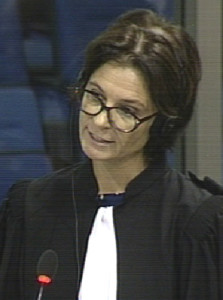
International Lead Co-Lawyer Marie Guiraud
International Civil Party Lead Co-Lawyer Marie Guiraud started her line of questioning of expert witness Peg LeVine. She inquired about rituals and the impact the loss thereof had on people’s lives under the Khmer Rouge. The expert replied that she had looked at the sequence of rituals; what was dropped, what was added, what was the dynamic and what the rituals of weddings and courtship were. What she noticed was a “dramatic change in the ritual structure” in the access people had to rituals formally; many sought rituals secretly, sometimes at the risk of feeling very afraid, and without rituals of protection. She also accounted for differences in rituals in urban and remote regions. The lack of rituals was “most disturbing” for respondents, and especially the lack of access of rituals for birth. She had included the word “dread” in her title, because it was a concept that in her view most accurately described the haunting notion. Moreover, everyone she spoke to saw dead bodies. What made this experience traumatic, she said, was the knowledge that it was most likely a violent death and the question, and, in the absence of rituals to make their spirits rest, the question of what happened to the spirits that remained on earth. “The unrest is profound”, the expert said.
Asked about the “issue of trust”, Ms. LeVine explained that it was more complex than simple mistrust. She gave the example of siblings: two sisters were evacuated from Phnom Penh and on their journey the older sister told the other a story that she had invented about their past. She kept on repeating this story for her sister to rehearse this. This was not a mistrust in the sister as such, but a mistrust in the developmental capacity of her sister, Ms. LeVine said. Hence, caution was heightened. Through the introduction of Angkar, she said that it brought a cosmological dimension of suspicion and dread.
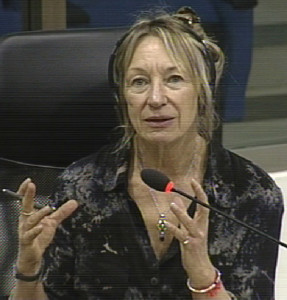
Expert witness Peg LeVine
Pre-1975, she said that the couple would have time to spend time together following the wedding and be recognized by the community. This gave the possibility of evaluation time, in which parents could assess. Ms. Guiraud then asked about her definition of “authentic marriage” that she had asked about in her sample. She explained that she terms she used were “not fake, recognized, official.” There was an atmosphere of mistrust, fear and hyper-vigilance.
Angkar
The more the term Angkar was used and the more things that were happening were associated with Angkar, the more people began to have that amorphous “it” interact with pre-existing animism and spirits. She said they could not comprehend the meaning of Angkar and therefore tied it to pre-existing notions. At their wedding, there was an association with a person, but when they left the ceremony, Angkar had a more metaphysical level.
Conscriptions
Ms. Guiraud asked whether the purpose of conscription of marriage was to serve the country. She said she could not “say for sure” whether there was a policy of conscripted marriage. She said that she saw the development of a policy by late 1978 into 1979. “Things were becoming much more consistent.” The consistency related to ceremony and structure. In Kandal itself, a 100 percent of her respondents reported having been told to consummate their marriage. There was a lack of consistency how people were chosen to marry. There were points of convergence. Ms. Guiraud asked how marriages could be conscripted but not a national policy. Speeches became much more consistent. “Loyalty was probably number one, and loving that person and staying with them for the rest of their life probably number two.” In late 1977/1978, less content of the speeches was devoted to the production of rice.
“It was like a machine”, she said. Ms. Guiraud asked about the increase of births that she had referred to in her book. The creation of the communal structure seemed to be a priority for the Khmer Rouge. The development of the structure was “very chaotic, unpredictable”. By the end of 1978, a structure seemed to develop. A lot of this was utilitarian, she said. Mass marriages were organized as a matter of convenience.
Ms. Guiraud asked whether she did not see a contradiction to say that marriages were not forced when she could not give a definition of the term, because she had not studied it. She replied that she established the authenticity of weddings through the perception of people. Even with the concept of coercion, she said, there was a continuum of coercion. She said that she did not see the contradiction between asking for the authenticity of weddings and concluding that there was no forced marriage. “The question was not appropriate given the method I followed”. One of the factors was that they described their marriages as authentic and real, but this were not all of her criteria. “An overriding factor was the dynamic relationship factor that people got confirmation from family members or other people they had relationships with that they were in a wedding that allowed them to declare that they were a couple. The response – the overwhelming response, of relief, again, keeping it in that context […] the relief factor was huge.” The overwhelming response was a sense of relief and decrease in dread and fear. Moreover, it created a link to their ancestors.
People were afraid, but the respondents in her sample did not receive direct threats.
There was a profound impact of fear on the people’s life. During the Democratic Kampuchea period, they talked graphically about the experiences and how they were deprived of sensual pleasures. To experience sensual pleasure of taste, sound and smell were robbed from the people, she said. As for silence being a way to survive, she referred to marriages and said that some felt safe for the first time to talk about things they would usually not talk about. Allowing for touch was important to people. She referred to an interview with a couple that had told her that their marriage was arranged ku-prin, meaning it was arranged by Buddha before they were born. The interview dragged on into the dark and the person became more afraid. The man started shaking. Prior to this, he had said that Angkar could “come out of the ground” and even appear today. It had a dissociating effect on the people to visit the sites again.
At this point, the President adjourned the hearing for a break.
Questions by the Nuon Chea Defense Team
After the break, Nuon Chea Defense Counsel Victor Koppe inquired about her methodology for her PhD thesis. After a brief discussion on her methodology, she explained that people had a tendency to wanting to convince her to look at the wedding in a different light. She pointed to an e-mail exchange she had.[1] Mr. Koppe wanted to know whether, if it was true that one of the objectives was to increase the population, it was not illogical to force people to marry, since reproduction was more difficult then. She replied that what Pol Pot had said then would align with people being in exclusive relationships. She said that she would have to ponder on the issue of logic more before giving an answer.
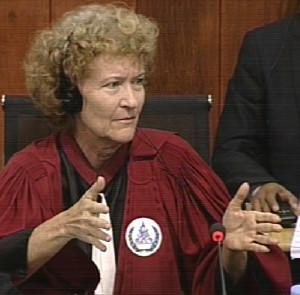
Judge Claudia Fenz
Mr. Koppe asked about climate of fear and the link of security centers. International Co-Prosecutor Nicholas Koumjian objected and said this went beyond the expertise of the expert. Judge Fenz asked her whether she was comfortable to answer the question, which she confirmed. She replied that it depended on the region and that the base line was sometimes lower.
Mr. Koppe read out a quote that said that some people had used the term Angkar misleadingly and that it should only be used for The Organization, and not an individual.[2] She had not observed this particular change. 22 percent said that they perceived Angkar as an individual, 38 percent attached a more spiritual-mythical meaning, and 40 percent did not know. She said the change came from a cultural artefact that had first existed and with which people tried to make sense.
As for the Civil Party testimonies, she questioned the “judgment and the values and drivenness of some of the organizations that may have been involved in getting the Civil Parties into the courtroom.”
With this, Ms. Koppe concluded his line of questioning and the floor was given to Ms. Guissé.
Ms. Guissé wanted to know whether that the issue of free will was culturally not at the heart of marriage was why she refrained from saying marriages were forced. She replied that carrying on the family honor was very important for the male part of the marriage. Children or youths, whether they wanted to or not, were obliged to listen to their parents. Mr. Koumjian interjected and said that she did not answer the question, which he understood to be why she did not ask why she had not asked about the consent.
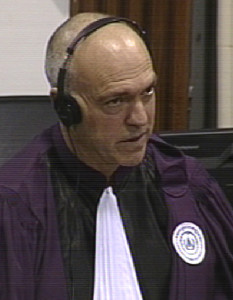
International Co-Prosecutor Nicholas Koumjian
She could see changes in patterns in locations and time in which parents were involved in the marriage in 1979. She saw a shift in the selection process depending on leaders and locations.
President of the Trial Chamber then issued oral rulings in relation to request to admit documents in relation to 2-TCCP-298 and 2-TCW-960.
New Civil Party: Pen Sochan
Civil Party Pen Sochan was born in Pursat Province. The Civil Party had first lived with her parents, before being evacuated to another village in Khnar Totoeng Commune in Bakan District, Pursat Province.
She was around fifteen or sixteen years old when she got married. There were around 12 couples altogether. She could not remember their names. She was told to go to the worksite to eat, and while she was walking she was told that she would be required to get married. Clothes were distributed to her, but she refused. “I said that I came here to eat”. They told her that she was mature enough to marry. “They told me that the others agreed and why did I refuse?”
During the ceremony, men were on one side and women on the other. “Although I refused, the unit chief required me to get married”. Mr. Ang showed a clip in which the Civil Party could be seen talking to a woman. The woman was the unit chief.[3] “She said to me: are you mature?” to which the Civil Party had asked her what this meant. The chief told her that she had to get married, because her name had already been listed by Oeun. “If you objected, you would be refashioned”, the unit chief had told her. She tried to run away. “I tried to beg them for mercy, but Comrade Om told me that I could not object, because the wheel of history had to move forward”. She was told that she had to follow Comrade Oeun’s order. “We were hungry and tired, and worse, we were forced to marry”. She was given a scarf and a black skirt on that day. “That was the point that made me suffer: The wedding took place without the participation of my siblings and relatives.” None of her relatives were aware of her wedding. “It was an authoritarian regime”. None of her friends were aware either. “Only Comrade Oeun and five militiamen were there”. Two made a speech and five militiamen were present. At that time, they made a speech that even if they did not like each other, they had to like each other and commit themselves to Angkar. Uncle Oeun made a speech that they had no choice and that it was Angkar’s instruction to get married and produce children.
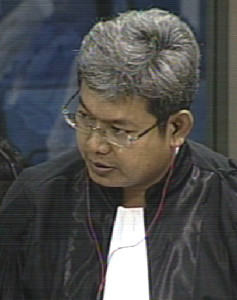
National Lead Co-Lawyer Pich Ang
None of the 12 couples made a speech. The male side made a commitment that they would take their wives for their whole lives. National Lead Co-Lawyer Pich Ang showed another clip of the “Red Wedding” documentary that was produced in 2012. The people she spoke to were Oeun and Om. The woman was the one who forced her to get married. The district chief Rom controlled ten cooperatives. Rom had four messengers. Her cooperative was under Rom’s control. This was located in Bakan District in Pursat Province. After the filming of the video, she went to see Rom. “I told him that during the Khmer Rouge we were forced to get married” and asked him for the reasons. He told her that he was “not a big person” and that there was no need to question him. “He actually prohibited us from filming him”. He had told him that he received the orders from Ta Mok. He had told them that he did not organize the forced marriages and that he had received instructions from others. “He told us that if we wanted to know the truth we should go and ask the dead body of Ta Mok”.
Wedding
She did not know her husband in person and his older brother told her that it was Om and Oeum who organized the wedding. The militiamen told her husband that he had to rape her, despite the fact that they did not know each other. “That night he slapped me, he beat me up”. She begged him and since he was tired he went to bed. They had built a floor of bamboo trees. They partitioned the building into twelve rooms and every couple had to sleep in one of the rooms. If she did not consummate her marriage, she would be killed in the third night if she continued to refuse. This was also showed in one of the video clips. During the third night, her husband tied her up and tore her pants apart.
Comrade Om refashioned her once during day time. She was told her that militiamen monitored them and had said that they had not consummated their marriage. She begged Om for mercy. Female cadres would advise the female side and the male cadres the male side. Her husband begged her husband not to mistreat her, and that night she escaped again. Her husband reported her.
Her husband married Bou Khom and his wife’s name is An, who died last month. One night, militiamen took off her clothes. “I was raped”, she said. Her husband raped her. “I was bleeding for one month as a result from that incident”. They were the same militiamen as the five militiamen who attended her wedding. “They were joking with each other”.
Rape
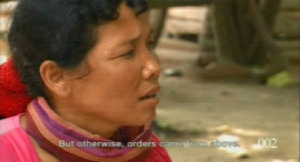
Civil Party Pen Sochan in the documentary Red Weddings
During the time that the militiamen watched them, they told them that they had to produce children for Angkar. During the third night, her husband tore her pants while the militiamen were watching. The bleeding continued for a period of two months. The militiamen said that it was good that they could produce children, laughed and left. She stopped resisting her husband when she saw the militiamen. He tied her to a pole of the house. She was thinking about how she would be treated the next nights. On the fourth night, she ran to her mother for help, but she told her that she could not help her. “She told me that she did not even know that I was getting married”. Her mother told her to leave, since she had to take care of her siblings and that there would be punishment if she was caught. Asked whether she had had her period at the time, she replied: “I was very young and I didn’t even know what period meant”. She drank some herbal medicine that her mother found for her. She stayed with her mother for only around two hours. She had to leave, because she was afraid that her parents and siblings would be killed if they caught her at her mother’s place.
She was not allowed to live with her mother, since they were afraid of their lives.
She got married in late 1978. She was in a mobile unit for around three months, in which she was required to make fertilizer by mixing water with cow dung. She was scolded that she used a piece of wood to stir the cow dung that she used, because the cow dung had worms in them and did not want to use her hands. The person scolded and beat her. She still has a scar from this today. She had scars on her leg as well.
Her grandfather worked at the Royal Palace and her father was a former soldier. They did not survive. “They were evacuated to Pursat” and she never saw them again. Mr. Ang concluded his line of questioning and the floor was handed to the Co-Prosecution.
Leading Cadres
Mr. Andrew Boyle inquired about the video. She replied that she was interviewed before the documentary was made. She handed in her Victim Information Form, after which they included her in the filming process. Her husband was around 30 years old at the time, while she was 15 or 16. She never saw him before. He worked around three kilometers away from where she worked. She had been threatened if she refused to consummate the marriage. A couple refused and disappeared.[4] Every three or four days, a couple would disappear. There were rumors that they were re-educated somewhere.
Om was a woman and her unit chief. She could be seen in the video clip. Oeun was also seen in the video and her superior. Rom was the chief of the district and in charge of around four or five cooperatives. Rom told her that she should ask Ta Mok. “She did not speak good words with me and she did not admit her wrongdoing. She said that she testified in this tribunal”. She took the messenger with her, but the messenger did not know the person At.[5] The male unit was in a distant place.
Because she was still young, “I was easily intimidated. I was told that I went there to eat, but when I arrived, I saw them distributing clothes. And I wanted the clothes. But they did not distribute the clothes for nothing. They required us to get married. Every one of us who were paired up to get married did not know this before”.
They did not use the word married at the time, but used the word “arranged family”. “I told Comrade Om that I was still young, I was not mature yet, and she disagreed with me”. Her husband was told to consummate the marriage from the first night onward. The five militiamen mentioned earlier told him so. She overheard that if couples held each other’s hands, they had to consummate the marriage. “When I heard this, I was terribly shocked”. They spied on them below their hut.
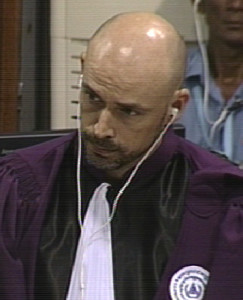
International Assistant Prosecutor Andrew Boyle
The militiamen did not attempt to rape her. “They laughed and then they walked away. And then they said before they walked away, that this is how things should go, that I should produce children for Angkar”. When she ran to her mother, the latter made a vegetable soup for her. When she finished eating, she left the house as suggested by her mother.
Mr. Boyle read out a quote of a former militiamen and asked whether she recalled a district educational office.[6] Mr. Boyle asked whether she had heard of Damnak Kanseng Commune where the militiamen was stationed. She had heard of the village.
At this point, the International Assistant Prosecutor concluded his line of questioning. Ms. Sochan’s testimony will continue tomorrow morning at 9 am.
[1] E3/76, at 00174276 (EN), 00132712 (KH).
[2] E3/740, at 00305412 (EN), 00082731 (KH), 00983932 (FR).
[3] E3/7233a
[4] E3/6034b, at 01143732 (EN), 01049458 (KH).
[5] At 00873734 (EN), 01140085 (FR), 00579598 (KH).
[6] E3/9832, answer 291.
